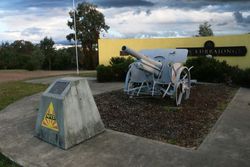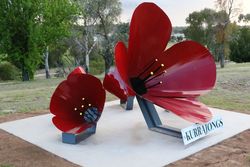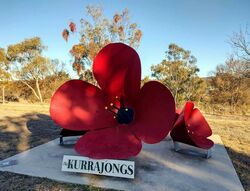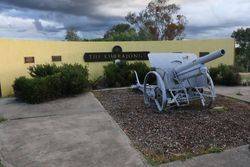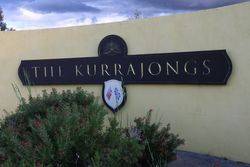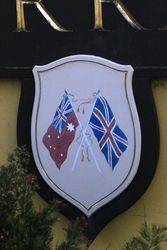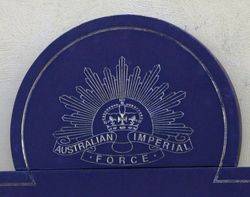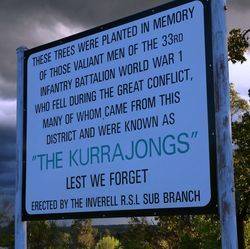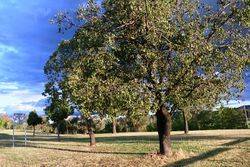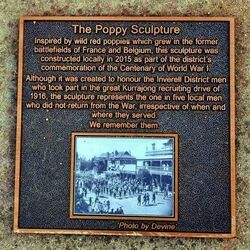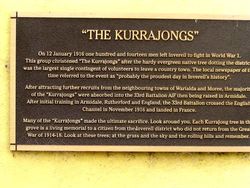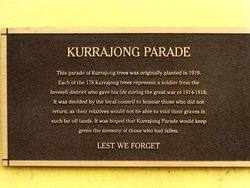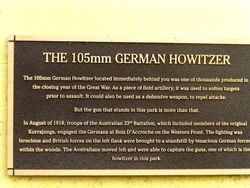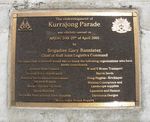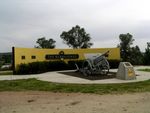
Home » Themes » Conflict » World War One
Kurrajong MemorialPrint Page 
The monument commemorates the men of Inverell and Districts known as "The Kurrajongs" who were the largest single contingent of men to leave a country town to enlist.
The monument comprises several elements including a wall which contains a number of dedication and explanatory plaques. The monument was an Inverell Apex Club Project, and dedicated on 25 April 2005. A German Howitzer Gun stands in front of the wall.
The monument also consists of a parade of Kurrajong trees originally planted in 1919. On 28 February 2016, the Kurrajong Re-enactment Committee planted two new Kurrajong trees to honour the fallen and also commemorate the Centenary of the departure from Inverell of the Second Kurrajongs contingent.
The Poppy Sculpture was installed at the site in 2015 to commemorate the centenary of ANZAC. The sculpture represents the one in five local men who did not return from the War, irrespective of when and where they served.
In January 1916 a group of 114 men left Inverell to fight in World War One. The group was named ‘The Kurrajongs', taking the name of the hardy evergreen Australian tree. The Kurrajongs march was one of a number of ‘snowball' recruitment marches fashioned on the famous Coo-ee recruiting march of 1915. The aim of these marches was to attract volunteers, starting with a nucleus of men and growing as the group travelled through the towns along their route. Travelling by train and visiting the neigbouring towns of Warialda and Moree, their numbers swelled to 150 by the time they reached the Narrabri Army Depot Camp. Most of the men subsequently enlisted in the 33rd Battalion AIF being raised at Armidale at the time.
Location
| Address: | Gwydir Highway (Glen Innes Road), The George Cartwright VC Reserve, Inverell, 2360 |
|---|---|
| State: | NSW |
| Area: | AUS |
| GPS Coordinates: | Lat: -29.781359 Long: 151.123469 Note: GPS Coordinates are approximate. |
Details
| Monument Type: | Monument |
|---|---|
| Monument Theme: | Conflict |
| Sub-Theme: | WW1 |
| Actual Event Start Date: | 04-August-1914 |
| Actual Event End Date: | 28-June-1919 |
Dedication
| Actual Monument Dedication Date: | Monday 25th April, 2005 |
|---|
Plaque :
"The Kurrajongs"
On 12 January 1916 one hundred and fourteen men left Inverell to fight in World War 1. This group christened "The Kurrajongs" after the hardy evergreen native tree dotting the district was the largest single contingent of volunteers to leave a country town. The local newspaper of the time referred to the event as "probably the proudest day in Inverell`s history".
After attracting further recruits from the neighbouring towns of Warialda and Moree, the majority of the "Kurrajongs" were absorbed into the 33rd Battalion AIF then being raised in Armidale. After initial training in Armidale, Rutherford and England, the 33rd Battalion crossed the English Channel in November 1916 and landed in France.
Many of the "Kurrajongs" made the ultimate sacrifice. Look around you. Each Kurrajong tree in the grove is a living memorial to a citizen from the Inverell district who did not return from the Great War of 1914-18. Look at these trees ; at the grass and the sky and the rolling hills and remember.
Plaque :
Kurrajong Parade
This parade of Kurrajong trees was originally planted in 1919. Each of the 178 Kurrajong trees represent a soldier from the Inverell district who gave his life during the great war of 1914-1918. It was decided by the local council to honour those who did not return, as their relatives would not be able to visit their graves in such far off lands. It was hoped that Kurrajong Parade would keep green the memory of those who had fallen.
Lest We Forget
Plaque :
The 105mm German Howitzer
The 105mm German Howitzer located immediately behind you was one of thousands produced in the closing year of the Great War. As a piece of field artillery, it was used to soften targets prior to assault. It could also be used as a defensive weapon, to repel attacks. But the gun that stands in this park is more than that. In August of 1918, troops of the Australian 33rd Battalion, which included members of the original Kurrajongs, engaged the Germans at Bois D`Accroche on the Western Front. The fighting was ferocious and British forces on the left flank were brought to a standstill by tenacious German forces within the woods. The Australians moved left and were able to capture the guns, one of which is the howitzer in this park.
Plaque :
The redevelopment of Kurrajong Parade was officially opened on ANZAC Day 25th of April 2005 by Brigadier Gary Bannister, Chief of Staff Joint Logistics Command.
The Apex Club of Inverell would like to thank the following organisations who have kindly contributed.
Inverell Shire Council. Inverell R.S.L. Sub-Branch. National Servicemans Association Inverell Branch. Boral Concrete - Inverell. Boral Masonary. Neumans Steel/Inverell Steel Supplies. M and S Moses Transport. Harris Seeds. Doug Higgins - bricklayer. Watkins Contractors and Landscape Supplies. Laurence and Hanson. Danthonia Designs. McLachlans Smash Repairs



